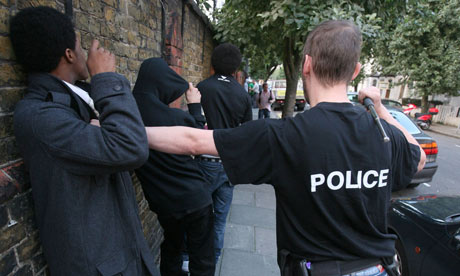Black people are 30 times more likely than white people to be stopped and searched by police in England and Wales, according to new analysis which reveals that "racial profiling" has increased over the past year.
Researchers say the findings, based on government statistics, represent the worst international record of discrimination involving stop and search.
The figures refer to the use of section 60, the contentious police power that allows officers to stop and search people without reasonable suspicion and which was cited as an aggravating factor behind the August riots. Analysis by the London School of Economics (LSE) and the Open Society Justice Initiative shows during the past 12 months a black person was 29.7 times more likely to be stopped and searched than a white person. That figure was 26.6 the previous year.
In 2009, black people were 10.7 times more likely to be stopped than whites under the controversial "exceptional" power. Mounting disquiet over the policy's damaging effect on black communities prompted Scotland Yard last week to announce a scaling back of its use of section 60, which has become a central element of the Yard's anti-knife crime strategy.
A separate analysis, based on Home Office data, reveals that less than 0.5% of section 60 searches led to an arrest for possession of a dangerous weapon, five times fewer than a decade ago.
Dr Michael Shiner, of the campaign group StopWatch and the Mannheim Centre for Criminology at the LSE, said: "More than ever, we need policing to be fair and accountable. All too often impacted communities have complained about abusive police tactics only to be ignored or, worse still, told they are wrong. Searches that do not require individual suspicion are particularly divisive and should be conducted sparingly, if at all.
"The very existence of section 60 should be critically reviewed and, if it is found to be necessary, increased safeguards and strict criteria should be put in place, including judicial authorisation, before the power can be mobilised."
On Friday, the IPCC conceded that stop and searches that yield no arrest were antagonistic and "highly intrusive". A legal challenge that will ask the high court to rule section 60 "incompatible" with the European convention on human rights is under way. The case centres on a 37-year-old woman who claims she was targeted because she was black. Michael Oswald of Bhatt Murphy solicitors said there was clear statistical evidence that section 60 was being used in a discriminatory manner. He added: "There are not sufficient safeguards to ensure that the interference with individuals' personal integrity and liberty that such searches entail is proportionate and in accordance with the law."
The case follows the government's curtailment last year of the police use of section 44 counter-terrorism stop-and-search powers, which also allowed officers to act against individuals without reasonable suspicion. Campaigners hope the home secretary, Theresa May, will pre-empt the legal challenge by moving to amend the law on section 60, introducing restrictions on its use. A recent report by the LSE and the Guardian cited stop and search as a factor in the August riots, a conclusion that persuaded May to order a national review of how police use stop and search powers.
Tomorrow the Met commissioner, Bernard Hogan-Howe, will give a public lecture on the future of policing at the LSE during which stop and search is expected to be a central theme. Last week he responded to the growing unease by ordering a radical overhaul of the use of section 60 in an effort to improve relations with black and ethnic minority communities.
In particular, Hogan-Howe pledged to halve the amount of section 60 stops that do not require reasonable suspicion. Senior commanders are believed to have voiced concern that they are ineffective and alienate young people, particularly those from ethnic minorities.
Although Hogan-Howe's new stance has been welcomed by campaigners, they point to his record at Merseyside police where he was chief constable from 2004 to 2009. When he began the role, officers conducted 1,389 section 60s, rising to 23,138 within five years.
